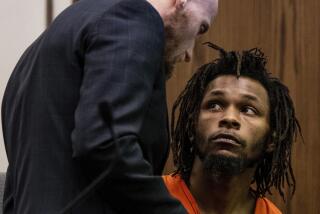Aurora movie massacre planned months in advance, prosecutors say
- Share via
CENTENNIAL, Colo. — Prosecution documents unsealed for the first time Friday in the case against James E. Holmes say he planned to kill people four months before unleashing a shooting rampage in July, killing 12 and injuring 58 others in a crowded movie theater.
A motion filed Aug. 14 by the prosecution states that Holmes, a 24-year-old former neuroscience doctoral student at the University of Colorado-Denver, told a classmate in March he wanted “to kill people … and that he would do so when his life was over.”
The newly released court documents also state that Holmes failed his graduate oral boards for the elite graduate program on June 7 and that he was “denied access to the school after June 12, 2012, after he made threats to a professor at the school.”
Then, according to the document, he began a “detailed and complex plan to obtain firearms, ammunition, a tear-gas grenade, body armor, a gas mask and a ballistic helmet” used in the crime.
Authorities say that on July 20, not long after the start of the new Batman movie at an Aurora movie theater, Holmes burst through an emergency exit, detonated a canister of tear gas, and then opened fire as terrified people tried to take cover, protect loved ones or scramble for safety.
He is charged with 24 counts of murder — two for each person killed — and a total of 142 criminal counts.
Holmes reportedly began buying guns at local gun stores from May to July and had been receiving large packages believed to contain chemicals for explosives and ammunition at his apartment and at the university for several months before the shooting. In addition to the movie shootings, Holmes is accused of concocting an elaborate booby-trap of explosives at his apartment, presumably designed to kill anyone who entered.
The prosecution motion — seeking to obtain Holmes’ student records from the university — was unsealed one day after a court hearing in the case in which Assistant Dist. Atty. Karen Pearson set forth a picture of a once-promising student on a downward spiral.
In arguing against a defense motion to disallow Holmes’ academic records, she revealed he had failed his oral exam, had been told by professors he should find another course of study, had made a threat serious enough that campus police were notified, and had lost access to some buildings on the Anschutz Medical Campus. Holmes began the process of withdrawing from the school on June 10, university officials have said.
What Pearson did not say on Thursday was that Holmes may have had a conversation about killing people as early as March.
Judge William Sylvester has not yet ruled on the defense motion to block the release of Holmes’ academic records, which remain sealed in the judge’s office.
Jacque Montgomery, executive director of media relations for the medical campus, on Friday told the Los Angeles Times that “Mr. Holmes was never banned from campus.” She said his access card, which gave him entrance to buildings after hours as well as certain secure buildings, was deactivated as part of the normal process when a student withdraws.
Montgomery did not comment on the prosecution’s suggestion that Holmes lost access because of a threat, saying she was not in court Thursday and was prohibited by the court’s gag order from saying anything more about the case.
Defense attorney Daniel King, who earlier described his client as mentally ill, on Thursday questioned the validity of Pearson’s account of Holmes activities on campus and accused the prosecution of a “fishing expedition.” He also argued that academic records are not to be released without a student’s permission under a federal law called the Family Educational Rights and Privacy Act.
Pearson countered that an exception to that law exists if records are used in a law enforcement investigation and that all aspects of Holmes’ life at the university — including grades, transcripts, admission application and emails to professors — are important evidence and relate to the march toward the July 20 shooting.
Next week the two sides are expected to face off over whether doctor-patient privilege covers a package Holmes sent to his campus psychiatrist that reportedly contains a notebook outlining his plans.
ALSO:
Umpire’s quick call credited with saving a life
Runaway cow in Montana: What happened to the cowboys?
NYC shooting: Firing starts as Mayor Bloomberg talks gun control
More to Read
Sign up for Essential California
The most important California stories and recommendations in your inbox every morning.
You may occasionally receive promotional content from the Los Angeles Times.










